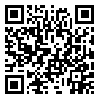BibTeX | RIS | EndNote | Medlars | ProCite | Reference Manager | RefWorks
Send citation to:
URL: http://jmed.ssu.ac.ir/article-1-670-en.html
Introduction: Professional ethics is defined as values, principles and norms governing the conduct of profession. Specific liabilities are required for each specific job. Due to the sensitivity of midwifery in health promotion, the present study aimed to determine the relationship between teachers professional ethics of teaching and midwifery students self- efficacy in the School of Nursing- Midwifery, Yazd.
Method: A cross-sectional descriptive study has been carried out in 2015. All undergraduate midwifery students in semester 3 and above answered Scherrer questionnaire of professional ethics and self-efficacy. the validity and reliability of the questionnaires have previously been approved. Descriptive and analytical statistics were analyzed using SPSS V.18.
Results: The mean and standard deviation of efficacy of midwifery students was 55.1± 26.09 and teachers’ professional ethics of teaching 82.61± 44.8. The relationship between these two variables with the Pearson correlation coefficient was (r=0.321 P= 0.001). The regression formula for linear relationship between two variables, efficacy and ethics of the profession showed Y=93.68 + 0.321 X. Increasing teachers professional ethics, midwifery students self-efficacy also increased (P=0.001). A significant relationship is found between the students’ self-efficacy and teachers’ personality traits(P=0.001) , mastery over the course content (P=0.049) and methodology of teaching (P=0.034) as well as observing the educational rules (P=0.030).
Conclusion: Regarding the relationship between the teachers’ professional ethics of teaching and students’ self-efficacy it is essential for teachers, planners and educators to consider components of professional ethics.
Received: 2016/02/1 | Accepted: 2016/05/3 | Published: 2016/12/13
| Rights and permissions | |
 |
This work is licensed under a Creative Commons Attribution-NonCommercial 4.0 International License. |





